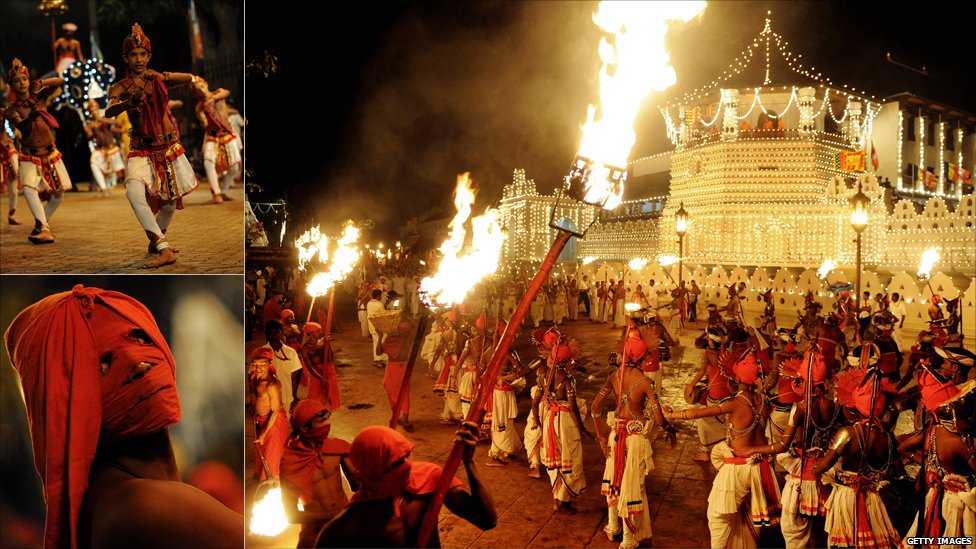Sri Dalada Maligawa (Sinhala: ශ්රී දළදා මාළිගාව) or the Temple of the Sacred Tooth Relic is a Buddhist temple in the city of Kandy, Sri Lanka. It is located in the royal palace complex which houses the relic of the tooth of Buddha. Since ancient times, the relic has played an important role in local politics because it is believed that whoever holds the relic holds the governance of the country. Kandy was the last capital of the Sri Lankan kings and is a UNESCO world heritage site partly due to the temple.
Monks of the two chapters of Malwatte and Asgiriya conduct daily worship in the inner chamber of the temple. Rituals are performed three times daily: at dawn, at noon and in the evenings. On Wednesdays there is a symbolic bathing of the Sacred Relic with an herbal preparation made from scented water and fragrant flowers, called Nanumura Mangallaya. This holy water is believed to contain healing powers and is distributed among those present.
The temple sustained damage from bombings at various times but was fully restored each time.
History
After the parinirvana of Gautama Buddha, the tooth relic was preserved in Kalinga and smuggled to the island by Princess Hemamali and her husband, Prince Dantha on the instructions of her father King Guhasiva.[1] They landed in the island in Lankapattana during the reign of King Kirthi Sri Meghavarna (301-328) and handed over the tooth relic. The king enshrined it Meghagiri Vihara (present day Isurumuniya) in Anuradhapura.
Safeguard of the relic was a responsibility of the monarch, therefore
over the years the custodianship of relic became to symbolize the right
to rule. Therefore reigning monarchs built the tooth relic temples quite
close to their royal residences, as was the case during the times of Anuradhapura, Polonnaruwa, Dambadeniya, Yapahuwa and Kurunegala kingdoms. During the era of Kingdom of Gampola the relic was housed in Niyamgampaya Vihara. It is reported in the messenger poems such as Hamsa, Gira, and Selalihini that the temple of tooth relic was situated within the city of Kotte when the kingdom was established there.[1]
During the reign of King Dharmapala, the relic was kept hidden in Delgamuwa Vihara, Ratnapura in a grinding stone.[1] It was brought to Kandy by Hiripitiye Diyawadana Rala and Devanagala Rathnalankara Thera. King Vimaladharmasuriya I built a two storey building to deposit the tooth relic and the building is now gone.[2] In 1603 when the Portuguese invaded Kandy, it was carried to Meda Mahanuwara in Dumbara. It was recovered in the time of Râjasimha II and it has been reported that he reinstate the original building or has built a new temple.[1] The present day temple of the tooth was built by Vira Narendra Sinha.[3] The octagonal Patthirippuwa and moat was added during the reign of Sri Vikrama Rajasinha. Famous Kandyan architect Devandra Mulacharin is credited with building the Patthirippuwa. Originally it was used by the kings for recreational activities and later it was offered to the tooth relic. Now it is an oriental library. It was attacked on two occasion, first in 1989 by the JVP and in 1998 by the LTTE.
During the reign of King Dharmapala, the relic was kept hidden in Delgamuwa Vihara, Ratnapura in a grinding stone.[1] It was brought to Kandy by Hiripitiye Diyawadana Rala and Devanagala Rathnalankara Thera. King Vimaladharmasuriya I built a two storey building to deposit the tooth relic and the building is now gone.[2] In 1603 when the Portuguese invaded Kandy, it was carried to Meda Mahanuwara in Dumbara. It was recovered in the time of Râjasimha II and it has been reported that he reinstate the original building or has built a new temple.[1] The present day temple of the tooth was built by Vira Narendra Sinha.[3] The octagonal Patthirippuwa and moat was added during the reign of Sri Vikrama Rajasinha. Famous Kandyan architect Devandra Mulacharin is credited with building the Patthirippuwa. Originally it was used by the kings for recreational activities and later it was offered to the tooth relic. Now it is an oriental library. It was attacked on two occasion, first in 1989 by the JVP and in 1998 by the LTTE.



No comments:
Post a Comment